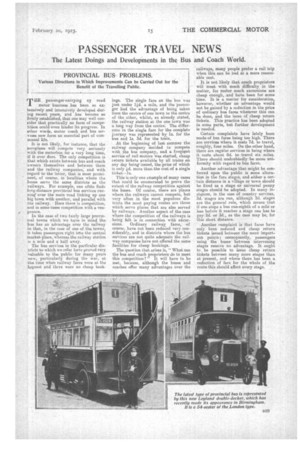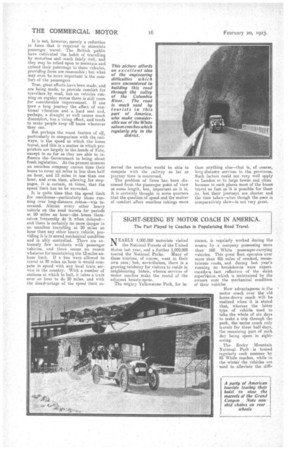PASSENGER TRAVEL NEWS
Page 15

Page 16

If you've noticed an error in this article please click here to report it so we can fix it.
The Latest Doings and Developments in the Bus and Coach World.
PROVINCIAL BUS PROBLEMS.
Various Directions in Which Improvements Can be Carried Out for the Benefit of the Travelling Public.
THE passenger-carrying lay road motor business has been so extensively.and intensively developed during recent years and has become so firmly established, that one may well consider that practically no form of competition could even hinder its progress. in other words, motor coach and bus services now form an essential part. of communal life. • It is not likely, for instance, that the aeroplane will compete very seriously with the motorbus for a very long time, if it ever does. The only competition is that which exists between bus and coach owners themselves and between them and the railway companies; and with regard to the latter, that is most prominent, of course, in localities where the buses serve the same districts as the railways. For example, one (Alan finds Jung-distance provincial bus services running over the main road linking up one big town with another, and parallel with the railway. Here there is competition, and in some cases competition with a yen
, geance.
In the case of two fairly large provincial towns which we have in mind the bus has an advantage over the railway in that, in the case of one of the towns, it takes passengers right ittto the central market-place, whereas the railway station is a mile and a half away.
The bus services in the particular districts to which we refer have proved very valuable. to the public for many years now, particularly during the war, at the time when railway fares were at the log nest and there were no cheap book fogs. The single fare on the bus was just under lid. a mile, and the passenger had the advantage of being taken from the centre of one town to the centre of the other, whilst., as already stated, the railway station at the one town was a long way from the centre. The difference in the single fare for the complete journey was represented by Is. for the bus and is. 3d. for the train.
At the beginning of last summer the railway company decided to compete with the bus company, and a frequent service of rail motors was started, cheap ieturrk tickets available by all trains on any day being issued, the.price of which is only id. more than.the cost of a single ti ckets—ls.
This is only one example of many cases that, could be enumerated to prove tho extent of the railway competition against the buses. Of course, there are places where the railways cannot compete, but very often in the most populous districts the most paying routes are those which serve places that are also served by railways. Another aspect of the case where the competition of the railways is being felt is in connection with excursions. Ordinary railway, fares, of course, have not been reduced very considerably, and in districts where the bus services are not quite adequate the railway companies have not offered the same facilities for cheap bookings.
The question that arises is, " What can the bus and coach proprietors do to meet this competition?" It will have to be met, because, although the buses and coaches offer many advantages over the railways, many people prefer a rail trip when this can be had at. a more reasonable cost.
It is not likely that coach proprietors will meet with much difficulty in the matter, for motor coach excursions are cheap enough, and have been for some time. It is a matter for consideration, however, whether an advantage would not be gained by a reduction in the price of ordinary bus fares wherever this can be done, and the issue of cheap return tickets. This practice has been adopted in some parts, but further development is needed.
Certain complaints have lately been made ofbus fares being too high. There are services where it costs 7d. to travel, roughly, four miles. On the other hand, there are regular services in being where it, costa about 8d. to travel six miles. There should undoubtedly be more uniformity with regard to bus fares.
Another advantage that might be conferred upon the public is some alteration in the fare stages, and either a certain distance in a village or town should be fixed as a stage or universal penny stages should be adopted. In many instances, in the case of country services, 3d. stages are run, although 2d. stages are the general rule, which means that if one stops a bus one-eighth of a, mile or less before it reaches a stage one has to pay 2d. or 3d., as the case may be, for this short distance.
Another complaint is that fares have only been reduced and cheap return tickets issued between the more important points; consequently, passengers using the buses between intervening stages receive no advantage. It ought to be possible to issue cheap return tickets between many more stages than at present, and where there has been a reduction of fare for the whole of the route this should affect every stage.
ft is not, however, merely a reduction in fares that is required to stimulate passenger travel. The British public have cultivated the habit of travelling by motorbus and ooach fairly well, a they may be relied upon to maintain and extend their patronage to these vehicles, providing fares are reasonable; but what may even be more important is the comfort of the passengers True, great efforts hays been made, and are being made, to provide comfort for travellers by road, but on vehicles running on regular routes there is still room for considerable improvement. If one toes a long journey the effect of continual vibration and a hard seat and, perhaps, a draught as well causes much discomfort, has a tiring effect, and tends to make people keep off buses whenever they can.
But perhaps the worst feature of all, particularly in comparison with the railways, is the speed at which the buses travel, and this is a matter in which proprietors are largely in the hands of Fate, except in so far as they are able to influence the Government, to bring about fresh legislation. At the present moment an omnibus company cannot time their buses to cover six miles in less than half an hour, and 12 miles in leas than one hour, and even then, allowing for stoppages, it is certain, at times, that the speed limit has to be exceeded.
, It is quite time that the speed limit for omnibuses—particularly those running over long-distance routes—was increased. Almost, every other heavy vehicle on the road travels for periods at 20 miles an hour—the buses themselves freouently do it when delayed— and there is certainly no more danger in an omnibus travelling at 20 miles an hour than any other heavy vehicle, providing it is in sound mechanical condition and is ably controlled. There are extremely few accidents with passenger vehicles, and there seems no reason whatever for maintaining the 12-miles-anhour limit. If a bus warn allowed to travel at 20 miles an hour it would compete in speed with any local train service in the country. With a number of stations at which to halt, it Lakes a train over an hour to do 20 miles, and with the disadvantage of the speed limit re moved the motorbus woukl be able to compete with the railway so far as journey time is concerned.
The problem of fares has been discussed from the passenger point of view at some length, but, important, as it is, it is certainly thought in some quarters that the question of speed and the matter of comfort affect omnibus takings more than anything else—that is, of course, long-distance services in the provinces. Such factors could not very well apply to London or to large towns and cities because in such places most of the buses travel as fast as it is possible for them to, but their jonrneys are shorter and the time taken—even though the pace is comparatively slow—is not, very great.






























